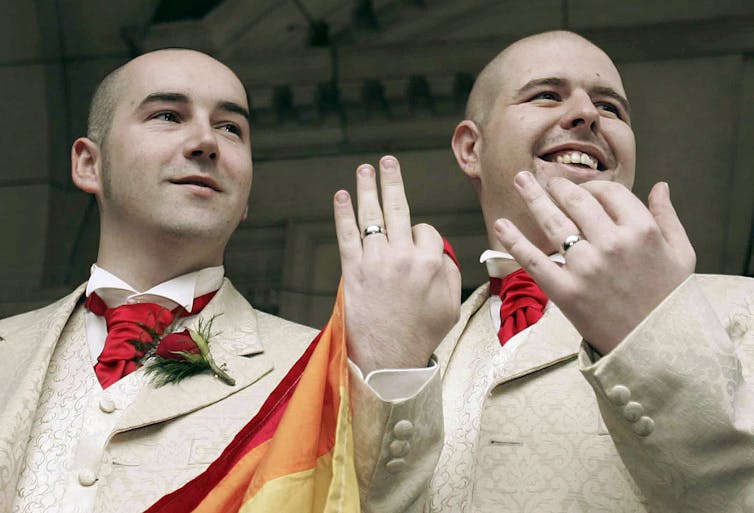The UK Supreme Court docket has dominated that civil partnerships ought to be accessible to heterosexual {couples}. The unanimous judgment marks the tip of a protracted and hard-fought authorized battle by Rebecca Steinfeld, Charles Keidan and their supporters, who argued that it was discriminatory to solely permit same-sex {couples} to type civil partnerships.
The Supreme Court docket discovered that the federal government had discriminated towards opposite-sex {couples} and breached the suitable to personal and household life by providing completely different types of recognition to reverse and same-sex {couples}. This corrects a weird authorized anomaly that meant same-sex {couples} may select between marriage or civil partnership, whereas for opposite-sex {couples}, marriage was the one type of authorized recognition accessible. Quickly – pending new laws – heterosexual {couples} who don’t need to marry will very possible be capable of type civil partnerships and safe authorized recognition in key areas, not least inheritance, advantages, taxation and parental rights.
The ruling may also convey a brand new lease of life for civil partnerships themselves. Again in 2005, civil partnerships had been launched with a lot fanfare from authorities and nice reduction amongst many LGBTQ+ individuals, who, then unable to marry, may ultimately have their relationships recognised in regulation. However whereas civil partnerships had been a welcome step ahead, the authorized rights they carried had been so much like marriage that it instantly turned tough to defend the exclusion of same-sex {couples} from marriage itself – arguably providing a extra significant social standing than civil partnership.
In 2014, the coalition authorities admitted the sport was up and legislated for equal marriage in England and Wales. Parallel laws was additionally handed in Scotland, although not in Northern Eire.
Since then, marriage has been the popular possibility for many same-sex {couples} in search of authorized recognition in England and Wales – however a small variety of new civil partnerships are nonetheless being registered. There was some head-scratching inside authorities, then, about what to do with civil partnerships.
Taking part in politics
A authorities assertion in Could sought to kick the problem into the lengthy grass till at the very least 2020, concluding that analysis was wanted earlier than deciding the way forward for civil partnerships. However by correcting a authorized nonsense that excluded opposite-sex {couples} from rights already loved by same-sex {couples}, the Supreme Court docket ruling pushed the problem again into the highlight.
The federal government ought to settle for this ruling and legislate as quickly as attainable, and it may throw its weight behind a Non-public Member’s Invoice on this challenge at the moment going via parliament. However the path to truly passing new laws will likely be rocky.

EPA/Paul McErlane
The prospect of providing heterosexual {couples} a authorized different to marriage is unlikely to take a seat simply with many Conservative MPs and their supporters, who may learn this as undermining a key social and authorized establishment. This was the explanation David Cameron opposed granting civil partnerships to opposite-sex {couples} when he was prime minister.
Then there’s the awkward matter of parliamentary arithmetic. Since its disastrous efficiency within the election of June 2017, Theresa Could’s authorities has relied on Northern Eire’s Democratic Unionist Occasion (DUP) to retain a working majority within the Home of Commons. Extremely socially conservative by British requirements, the DUP is unlikely to be captivated with extending civil partnerships to straight {couples}.
Northern Eire stays the one a part of the UK and Eire the place same-sex {couples} can not legally marry, and the Supreme Court docket’s judgment means it could absolutely be untenable for Northern Eire to legislate for civil partnerships for straight {couples} with out legalising same-sex marriage on the similar time. To take any steps on this course would subsequently require a serious shift in pondering for the DUP and its socially conservative base.
Function reversal
The Supreme Court docket ruling is a reminder that coverage can result in unintended penalties. Civil partnerships had been launched as a fast repair for a minority group. Though it was all the time clear this might result in stress for equal marriage, few imagined that LGBTQ+ {couples} would leapfrog their straight {couples} in having the ability to select between marriage and civil partnership.
The concept that straight {couples} would at some point be clamouring for civil partnerships as an alternative choice to marriage was not on the coverage radar in any respect – and as an alternative, for as soon as, heterosexuals have been campaigning for rights already granted to LGBTQ+ individuals.
After all, the federal government may reply to the judgment by abolishing civil partnerships altogether. That may be perverse, since it could pressure individuals already in civil partnerships to transform their partnerships to marriages. As a substitute, the federal government ought to chunk the bullet and be taught from expertise elsewhere.
Near house, the Isle of Man has legislated for civil partnerships for similar and different-sex {couples} alike, and household life there has not but descended into anarchy because of this. In different nations the place straight {couples} have entry to an alternative choice to marriage, such because the Netherlands, most select marriage as the popular type of authorized and social recognition. So if civil partnership is the authorized standing that refuses to die, there’s nonetheless fairly a little bit of life left in marriage as properly.
Supply By https://theconversation.com/civil-partnerships-go-mainstream-as-supreme-court-corrects-a-legal-nonsense-99062